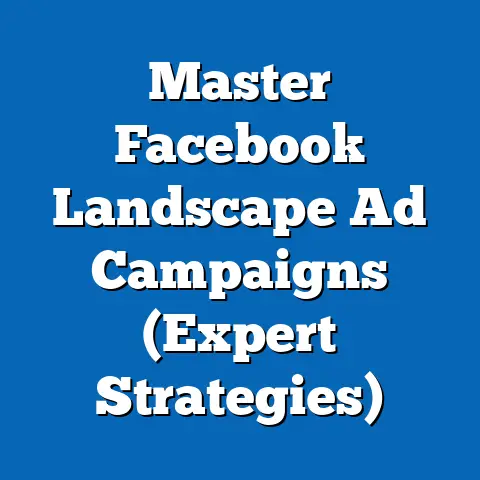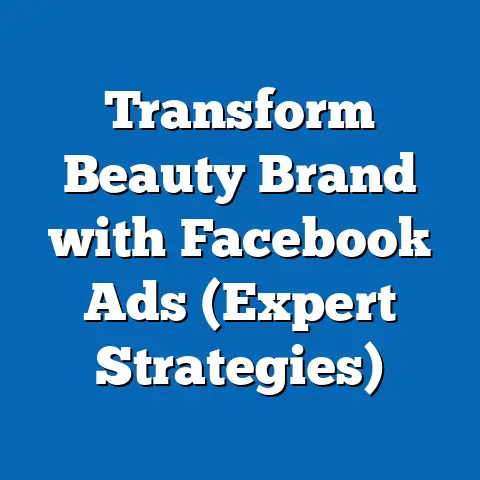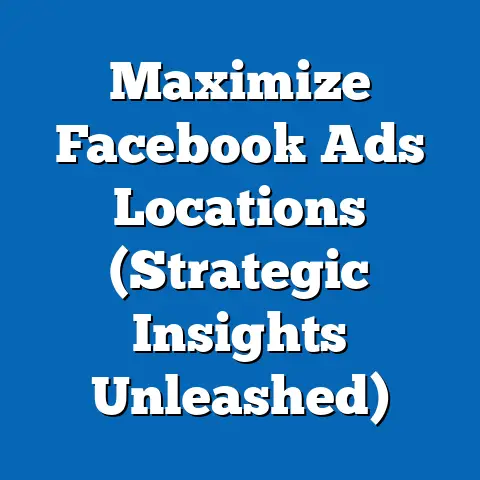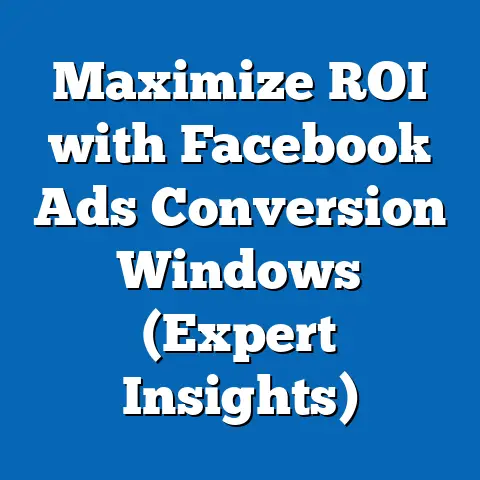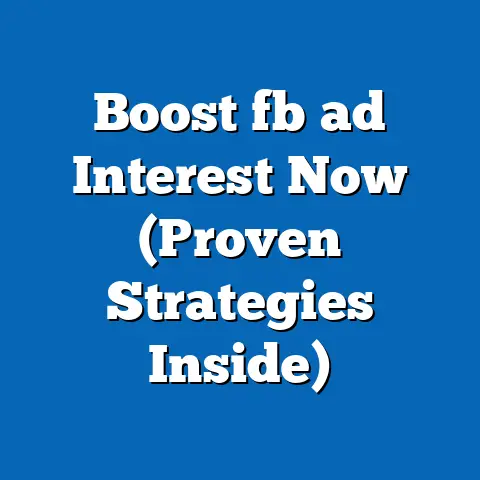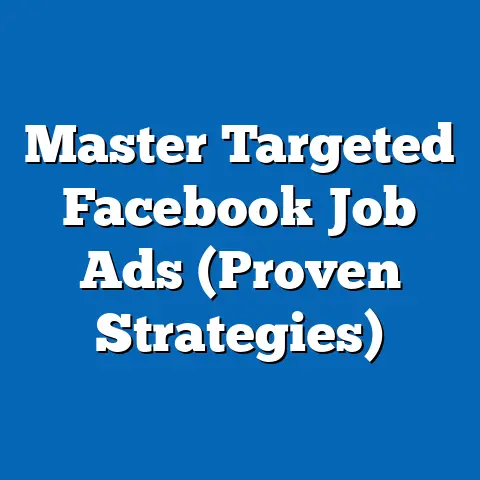Master Facebook Resell Ads (Boost Profits Instantly)
I remember the exact moment I understood the power of Facebook ads.
It was a sunny afternoon, and I was sitting at a local café, catching up with an old friend.
He was excitedly showing me his phone, not about a new gadget or a funny meme, but his Facebook ad campaign.
He was reselling vintage clothing, and his ads were generating a surprising amount of sales.
The image was simple – a well-lit photo of a stylish jacket – but the targeting was laser-focused.
That day, I realized Facebook wasn’t just a place for cat videos and political debates; it was a powerful engine for small businesses to connect with their ideal customers, and it sparked my journey into mastering Facebook resell ads.
1. Introduction to Facebook Resell Ads
Facebook resell ads are advertisements specifically designed to promote the resale of products on the Facebook platform.
Unlike traditional marketing campaigns that focus on brand-new items, resell ads target consumers looking for pre-owned, vintage, or discounted goods.
These ads leverage Facebook’s robust targeting capabilities to connect sellers with potential buyers interested in specific items or categories.
Why are they important?
In today’s market, sustainability and affordability are becoming increasingly important to consumers.
The rise of platforms like Depop, Poshmark, and ThredUp demonstrates the growing popularity of buying and selling pre-owned items.
Facebook, with its massive user base and sophisticated advertising tools, provides an unparalleled opportunity for resellers to reach a wide audience and capitalize on this trend.
Statistics & Trends: According to a recent report by ThredUp, the secondhand market is projected to reach $64 billion by 2024.
This growth is fueled by younger generations, particularly Gen Z and Millennials, who are more likely to embrace sustainable consumption habits.
Furthermore, Facebook’s own data shows a significant increase in engagement with resale-related groups and pages, indicating a strong demand for pre-owned products within its user base.
Key Takeaway: Facebook resell ads are a powerful tool for tapping into the growing secondhand market, offering a cost-effective way to reach a large and engaged audience.
2. Understanding the Resell Market on Facebook
The resell market on Facebook is diverse and dynamic, encompassing a wide range of products and consumer behaviors.
Understanding these dynamics is crucial for crafting effective ad campaigns.
Types of Products Commonly Resold: You can find almost anything being resold on Facebook, but some categories are particularly popular:
- Clothing and Accessories: Vintage clothing, designer bags, shoes, and jewelry.
- Electronics: Smartphones, laptops, gaming consoles, and accessories.
- Furniture and Home Goods: Used furniture, decor items, and kitchen appliances.
- Baby and Kids Items: Clothing, toys, strollers, and other baby gear.
- Collectibles: Antiques, memorabilia, and rare items.
Consumer Behavior in the Resell Market: Consumers in the resell market are often driven by a combination of factors:
- Price Sensitivity: They are looking for deals and discounts on products they want or need.
- Sustainability Concerns: They want to reduce their environmental impact by buying pre-owned items.
- Uniqueness: They are looking for unique or vintage items that are not readily available in retail stores.
- Convenience: They appreciate the ease and accessibility of buying and selling on Facebook.
Why Facebook is an Optimal Platform: Facebook’s advantages for the resell market include:
- Large User Base: Facebook has billions of active users, providing a massive potential audience for your ads.
- Targeting Capabilities: Facebook’s sophisticated targeting options allow you to reach specific demographics, interests, and behaviors.
- Community Features: Facebook Groups provide a built-in community for buying and selling specific items.
- Mobile-First Platform: Facebook is primarily a mobile platform, making it easy for users to browse and purchase items on their smartphones.
Key Takeaway: The resell market on Facebook is a thriving ecosystem driven by price sensitivity, sustainability concerns, and the desire for unique items.
Facebook’s platform offers the reach, targeting, and community features needed to succeed in this market.
3. Setting Up Your Facebook Business Account
Before you can start running Facebook resell ads, you need to set up a Facebook Business Manager account.
This is a central hub for managing your Facebook pages, ad accounts, and other business assets.
Step-by-Step Guide to Creating a Facebook Business Manager Account:
- Go to business.facebook.com: Navigate to the Facebook Business Manager website.
- Click “Create Account”: Follow the prompts to create a new Business Manager account.
- Enter Your Business Information: Provide your business name, contact information, and website (if applicable).
- Add Your Facebook Page: If you already have a Facebook page for your business, add it to your Business Manager account.
If not, you can create a new page. - Create an Ad Account: Create a new ad account within your Business Manager account.
You will need to provide your payment information. - Add Team Members: Add team members to your Business Manager account and assign them appropriate roles and permissions.
Importance of Setting Up a Business Page: Your Facebook Business Page is your storefront on Facebook.
It’s where potential customers can learn about your business, browse your products, and contact you with questions.
Tips for Optimizing Your Business Page:
- Use a Professional Profile Picture and Cover Photo: Your profile picture should be your logo or a clear image of your product.
Your cover photo should be visually appealing and relevant to your business. - Write a Compelling “About” Section: Explain what your business does and what makes it unique.
- Include Your Contact Information: Make it easy for customers to contact you by providing your phone number, email address, and website (if applicable).
- Post Regularly: Share engaging content that is relevant to your target audience.
- Encourage Reviews: Ask satisfied customers to leave reviews on your page.
Key Takeaway: Setting up a Facebook Business Manager account and optimizing your business page are essential steps for running successful Facebook resell ads.
This establishes your online presence and provides a platform for engaging with potential customers.
4. Creating Effective Ad Campaigns
Creating effective ad campaigns is the heart of successful Facebook reselling.
Your ads need to grab attention, communicate value, and drive conversions.
Key Elements of a Successful Facebook Ad:
- Visuals: High-quality images or videos that showcase your product in the best possible light.
- Copy: Compelling ad text that highlights the benefits of your product and encourages users to take action.
- Call-to-Action (CTA): A clear and concise call-to-action that tells users what you want them to do (e.g., “Shop Now,” “Learn More,” “Contact Us”).
Examples of High-Performing Ad Campaigns within the Resell Niche:
- Vintage Clothing: An ad featuring a model wearing a vintage dress, with the copy highlighting the dress’s unique style and affordable price.
The CTA could be “Shop Now” or “View Collection.” - Electronics: An ad showcasing a refurbished smartphone, with the copy emphasizing its like-new condition and significant discount compared to a new phone.
The CTA could be “Learn More” or “Buy Now.” - Furniture: An ad featuring a stylishly staged photo of a used couch, with the copy highlighting its comfort, durability, and low price.
The CTA could be “Contact Us” or “Get a Quote.”
Choosing the Right Ad Format:
- Single Image Ads: Best for showcasing individual products with a clear and concise message.
- Carousel Ads: Allow you to showcase multiple products in a single ad, with each image linking to a different product page.
This is great for showcasing a range of items.
I’ve used this to show off a variety of vintage t-shirts, and it resulted in a higher click-through rate! - Slideshow Ads: Create a video-like experience using a series of images, perfect for showcasing a product’s features or benefits.
- Video Ads: The most engaging ad format, allowing you to tell a story and connect with your audience on a deeper level.
Key Takeaway: Effective Facebook ads combine high-quality visuals, compelling copy, and a clear call-to-action.
Choosing the right ad format for your products is essential for maximizing engagement and driving conversions.
5. Targeting Your Audience
Facebook’s audience targeting options are incredibly powerful, allowing you to reach specific demographics, interests, and behaviors.
Mastering these options is crucial for ensuring your ads are seen by the people most likely to buy your products.
Facebook’s Audience Targeting Options:
- Demographics: Target users based on age, gender, location, education, and other demographic factors.
- Interests: Target users based on their interests, hobbies, and passions.
- Behaviors: Target users based on their online behavior, such as their purchase history, device usage, and travel habits.
Strategies for Identifying and Reaching Your Ideal Customer Base:
- Research Your Target Audience: Understand their demographics, interests, and behaviors.
What are their pain points?
What are they looking for in a product like yours? - Use Facebook Audience Insights: This tool provides valuable data about your target audience, including their demographics, interests, and page likes.
- Test Different Targeting Options: Experiment with different targeting options to see what works best for your products.
Creating Custom Audiences and Lookalike Audiences:
- Custom Audiences: Allow you to target users based on your own data, such as your email list, website visitors, or app users.
I’ve had huge success uploading customer lists and targeting ads to those people.
It’s a great way to reward loyal customers! - Lookalike Audiences: Allow you to create new audiences that are similar to your existing customers or website visitors.
Facebook analyzes the characteristics of your source audience and finds other users who share similar traits.
These are a game-changer for scaling your campaigns.
Key Takeaway: Facebook’s audience targeting options are a powerful tool for reaching your ideal customer base.
By researching your target audience, using Facebook Audience Insights, and creating custom and lookalike audiences, you can ensure your ads are seen by the people most likely to buy your products.
6. Budgeting and Bidding for Ads
Setting the right budget and bidding strategy is essential for maximizing your return on investment (ROI) on Facebook ads.
You need to balance your desire to reach a large audience with the need to stay within your budget.
Budgeting Options:
- Daily Budget: The average amount you’re willing to spend on your ad campaign each day.
Facebook will try to spend this amount each day, but it may vary slightly. - Lifetime Budget: The total amount you’re willing to spend on your ad campaign over its entire duration.
Facebook will try to spread your budget evenly over the campaign’s lifespan.
Bidding Strategies:
- Automatic Bidding: Facebook automatically sets your bids to get the most results for your budget.
This is a good option for beginners. - Manual Bidding: You set your bids manually, giving you more control over how much you spend per result.
This is a good option for experienced advertisers who want to optimize their bids for specific goals.
Maximizing ROI:
- Start Small and Scale Up: Begin with a small budget and gradually increase it as you see positive results.
- Monitor Your Ad Performance: Track your key performance indicators (KPIs) to see how your ads are performing.
- Adjust Your Budget and Bids: Based on your ad performance, adjust your budget and bids to optimize your ROI.
Insights into Monitoring and Adjusting Your Budget:
- Frequency: Keep an eye on the frequency metric.
If your frequency is too high (users are seeing your ad too many times), you may need to expand your audience or refresh your ad creative. - Cost Per Result: Monitor your cost per result (e.g., cost per click, cost per conversion).
If your cost per result is too high, you may need to adjust your targeting, bidding strategy, or ad creative. - Relevance Score: Facebook assigns a relevance score to your ads based on how relevant they are to your target audience.
A higher relevance score can lead to lower costs and better ad performance.
Key Takeaway: Setting the right budget and bidding strategy is crucial for maximizing your ROI on Facebook ads.
By starting small, monitoring your ad performance, and adjusting your budget and bids, you can optimize your ad spend and achieve your business goals.
7. Analyzing Ad Performance
Analyzing ad performance is essential for understanding what’s working and what’s not.
By tracking key performance indicators (KPIs) and using Facebook Ads Manager to analyze your campaign performance, you can identify areas for improvement and optimize your ads for better results.
Key Performance Indicators (KPIs):
- Reach: The number of unique people who saw your ad.
- Impressions: The number of times your ad was displayed.
- Clicks: The number of times people clicked on your ad.
- Click-Through Rate (CTR): The percentage of people who saw your ad and clicked on it.
- Cost Per Click (CPC): The average cost of each click on your ad.
- Conversions: The number of people who took the desired action after seeing your ad (e.g., making a purchase, filling out a form).
- Conversion Rate: The percentage of people who clicked on your ad and then took the desired action.
- Return on Ad Spend (ROAS): The amount of revenue you generated for every dollar you spent on ads.
Using Facebook Ads Manager:
- Overview: Provides a snapshot of your overall ad performance, including your reach, impressions, clicks, and conversions.
- Campaigns: Allows you to view the performance of individual ad campaigns.
- Ad Sets: Allows you to view the performance of individual ad sets within a campaign.
- Ads: Allows you to view the performance of individual ads within an ad set.
A/B Testing:
- What is A/B Testing?: A/B testing (also known as split testing) involves creating two versions of an ad with a single variation (e.g., different headline, image, or call-to-action) and then testing which version performs better.
- Why is A/B Testing Important?: A/B testing allows you to identify the most effective elements of your ads and optimize them for better results.
- How to Conduct A/B Tests: Use Facebook’s A/B testing tool to create and run split tests.
Track the performance of each version of your ad and identify the winner.
Key Takeaway: Analyzing ad performance is essential for understanding what’s working and what’s not.
By tracking key performance indicators (KPIs), using Facebook Ads Manager, and conducting A/B tests, you can optimize your ads for better results and maximize your ROI.
8. Scaling Your Facebook Resell Ads
Once you’ve found a winning ad campaign, the next step is to scale it without losing its effectiveness.
Scaling involves increasing your budget, expanding your audience, and diversifying your product lines.
Strategies for Scaling:
- Increase Your Budget Gradually: Avoid increasing your budget too quickly, as this can disrupt your ad performance.
Start with a small increase and gradually increase it as you see positive results. - Expand Your Audience: Create lookalike audiences based on your existing customers or website visitors.
- Diversify Your Product Lines: Offer a wider range of products to appeal to a broader audience.
Reinvesting Profits:
- The Power of Reinvestment: Reinvesting your profits into ad spend is crucial for sustained growth.
The more you invest in advertising, the more customers you can reach and the more sales you can generate. - Setting a Reinvestment Rate: Determine a percentage of your profits to reinvest in advertising.
A good starting point is 20-30%.
Expanding Product Lines and Targeting New Customer Segments:
- Identifying New Opportunities: Look for new product lines that are related to your existing products or that appeal to a similar target audience.
- Testing New Products: Before investing heavily in a new product line, test it with a small ad campaign to see if it resonates with your target audience.
- Adapting Your Messaging: Tailor your ad messaging to appeal to the specific needs and interests of each customer segment.
Key Takeaway: Scaling your Facebook resell ads involves increasing your budget, expanding your audience, and diversifying your product lines.
Reinvesting your profits into ad spend is crucial for sustained growth.
9. Legal and Ethical Considerations
Running Facebook ads comes with legal and ethical responsibilities.
It’s important to understand these considerations to avoid potential legal issues and maintain a positive reputation with your audience.
Legal Requirements:
- Truth in Advertising: Ensure that your ads are truthful and not misleading.
Avoid making false claims about your products or services. - Disclosure Requirements: Disclose any material connections between you and the products or services you’re promoting.
This is particularly important for affiliate marketing. - Copyright and Trademark Laws: Respect copyright and trademark laws.
Do not use copyrighted images or logos without permission. - Facebook’s Advertising Policies: Familiarize yourself with Facebook’s advertising policies and ensure that your ads comply with these policies.
Ethical Marketing Practices:
- Transparency: Be transparent about your business practices and the products or services you’re selling.
- Respect for Privacy: Respect the privacy of your audience.
Do not collect or use personal information without their consent. - Avoid Deceptive Practices: Avoid using deceptive practices, such as clickbait or fake reviews.
- Build Trust: Focus on building trust with your audience by providing high-quality products and services and treating them with respect.
The Importance of Transparency in Reselling:
- Disclosing the Condition of Products: Accurately describe the condition of your products.
Be honest about any flaws or imperfections. - Providing Accurate Information: Provide accurate information about the origin and history of your products.
- Building a Reputation for Honesty: Building a reputation for honesty and transparency will help you attract and retain customers.
Key Takeaway: Running Facebook ads comes with legal and ethical responsibilities.
By understanding and complying with these considerations, you can avoid potential legal issues and maintain a positive reputation with your audience.
10. Case Studies of Successful Facebook Resell Ads
Let’s look at some real-world examples of how others have successfully leveraged Facebook resell ads to boost their profits.
Case Study 1: Vintage Clothing Reseller
- Business: A small business that resells vintage clothing online.
- Challenge: Reaching a large and engaged audience of vintage clothing enthusiasts.
- Solution: The business created a series of Facebook ads featuring high-quality images of their vintage clothing items.
They targeted their ads to users interested in vintage fashion, retro style, and sustainable clothing. - Results: The business saw a significant increase in website traffic and sales.
Their Facebook ads generated a ROAS of 4:1. - Lessons Learned: High-quality visuals and targeted advertising are essential for success in the vintage clothing market.
Case Study 2: Electronics Refurbisher
- Business: A company that refurbishes and resells used electronics, such as smartphones and laptops.
- Challenge: Overcoming the stigma associated with buying used electronics.
- Solution: The company created a series of Facebook ads emphasizing the quality and reliability of their refurbished electronics.
They highlighted the fact that their products were thoroughly tested and came with a warranty. - Results: The company saw a significant increase in sales of their refurbished electronics.
Their Facebook ads helped them overcome the stigma associated with buying used products. - Lessons Learned: Emphasizing quality and reliability can help overcome consumer concerns about buying used products.
Case Study 3: Furniture Reseller
- Business: An individual who resells used furniture on Facebook Marketplace.
- Challenge: Standing out from the competition in a crowded marketplace.
- Solution: The individual created a series of Facebook ads featuring stylishly staged photos of their furniture items.
They highlighted the unique character and affordable price of their furniture. - Results: The individual saw a significant increase in inquiries and sales of their furniture.
Their Facebook ads helped them stand out from the competition. - Lessons Learned: Stylish staging and compelling photography can help you stand out from the competition in the furniture market.
Key Takeaway: These case studies demonstrate the power of Facebook resell ads for boosting profits in a variety of industries.
By using high-quality visuals, targeted advertising, and compelling messaging, you can achieve similar results.
11. Future Trends in Facebook Resell Advertising
The world of Facebook advertising is constantly evolving.
Staying ahead of the curve and understanding emerging trends is crucial for long-term success.
Emerging Trends:
- AI-Powered Ad Targeting: Facebook is increasingly using artificial intelligence (AI) to improve ad targeting.
In the future, AI may be able to predict which users are most likely to be interested in your products based on their online behavior and purchase history. - Augmented Reality (AR) Ads: Augmented reality (AR) ads allow users to try on products virtually before they buy them.
This can be particularly useful for selling clothing, accessories, and cosmetics. - Personalized Ads: Consumers are increasingly demanding personalized advertising experiences.
In the future, Facebook ads may become even more personalized, tailoring the ad creative and messaging to each individual user. - Video-First Advertising: Video is becoming the dominant form of content on social media.
In the future, video ads are likely to become even more important for reaching and engaging your target audience.
Impact of AI and Machine Learning:
- Improved Ad Targeting: AI and machine learning can help you identify the most relevant users for your ads, leading to higher click-through rates and conversion rates.
- Automated Ad Optimization: AI can automatically optimize your ad campaigns based on real-time data, saving you time and effort.
- Personalized Ad Experiences: AI can help you create personalized ad experiences that are tailored to the individual needs and interests of each user.
Key Takeaway: The future of Facebook resell advertising is likely to be driven by AI, AR, personalization, and video.
By staying ahead of these trends, you can position yourself for long-term success.
12. Conclusion
Mastering Facebook resell ads is within reach for anyone willing to put in the effort.
By understanding the dynamics of the resell market, setting up your Facebook Business account, creating effective ad campaigns, targeting your audience, budgeting and bidding for ads, analyzing ad performance, scaling your campaigns, and considering legal and ethical considerations, you can unlock the power of Facebook advertising and boost your profits instantly.
Don’t be afraid to experiment, test new strategies, and learn from your mistakes.
The world of Facebook advertising is constantly evolving, so it’s important to stay curious and keep learning.
Now is the time to take action and start your journey with Facebook resell ads.
The potential rewards are significant, and with the right strategies, you can transform your small business into a thriving enterprise.
Good luck!

